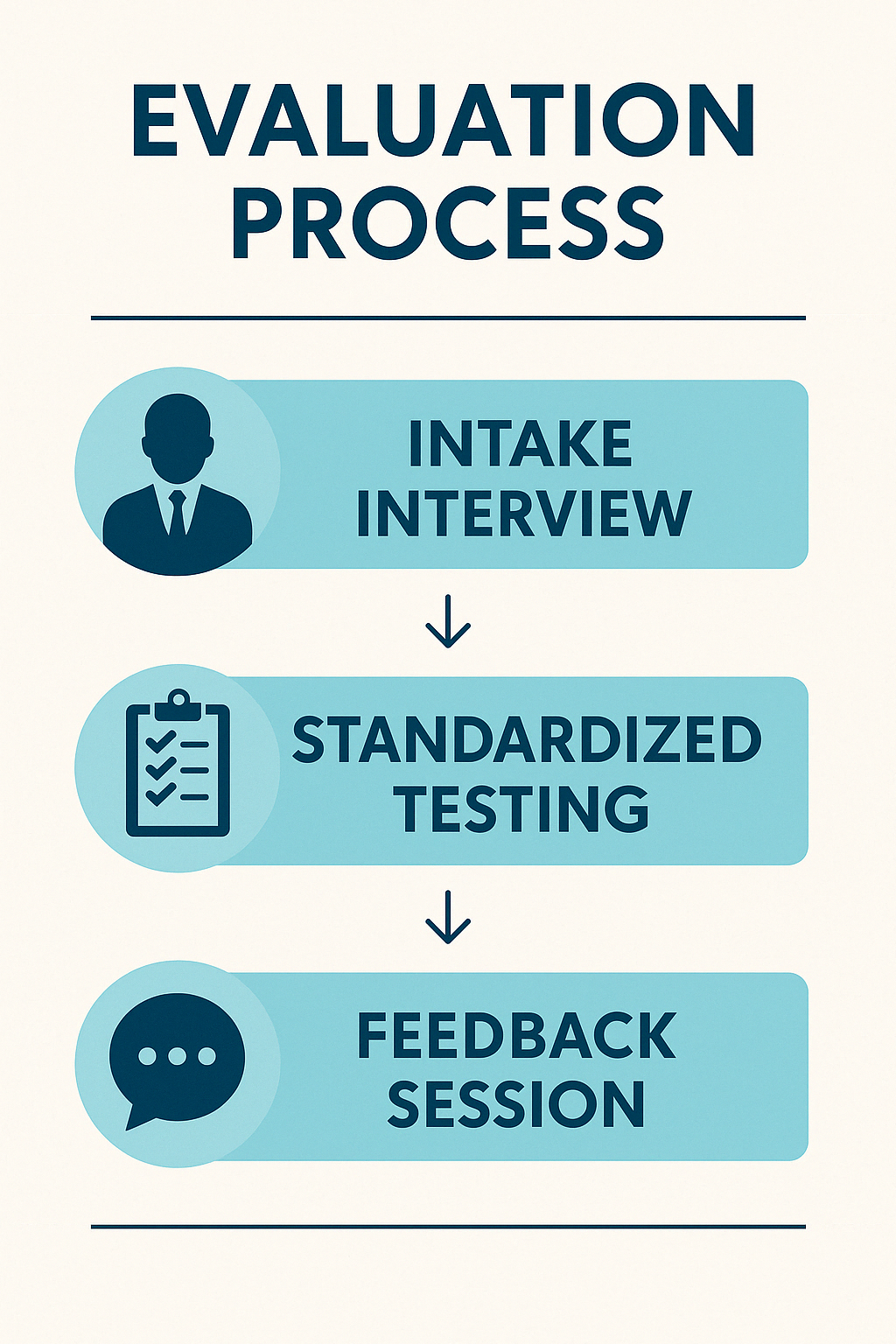Where to Get Tested for Autism as an Adult in 2025

Hey friend! 👋 If you’ve been wondering whether your lifelong quirks and sensory sensitivities might be autism, you’re not alone. Adult autism diagnoses have been skyrocketing, so here’s your forward‑thinking, step‑by‑step guide to getting tested in 2025.
Why Adult Autism Testing Matters
Many adults have gone their entire lives without recognizing their different way of experiencing the world. This experience might be attributed to autism spectrum disorder (ASD). Getting diagnosed as an adult can provide:
- Clarity and self-understanding: Finally having an explanation for lifelong challenges
- Access to support services: Many resources are only available with a formal diagnosis
- Workplace accommodations: Legal protections under the ADA
- Community connection: Finding others with similar experiences
- Personal validation: Confirming that your experiences are real and shared by others
The journey to diagnosis can be emotionally complex. However, many adults report feeling an enormous sense of relief. They finally understand the neurological differences that have shaped their experiences.
Types of Evaluations
Adult autism evaluations typically fall into three categories:
Comprehensive Neuropsychological Assessment
- Most thorough option
- Includes cognitive testing, developmental history, and behavioral observations
- Typically conducted by neuropsychologists or developmental psychologists
- Duration: Usually 6-12 hours spread across multiple sessions
- Pros: Extremely detailed, rules out other conditions, and most widely accepted
- Cons: Most expensive, longest wait times
Clinical Diagnostic Assessment
- Focused specifically on autism traits
- Uses standardized tools like ADOS-2 and ADI-R
- Conducted by psychologists, psychiatrists, or neurologists with autism expertise
- Duration: 2-4 hours, sometimes split across sessions
- Pros: More affordable than a comprehensive assessment, widely recognized
- Cons: May not explore co-occurring conditions as thoroughly
Self-Assessment Screening
- Preliminary step, not a formal diagnosis
- Uses validated screening tools like AQ (Autism Quotient) or RAADS-R
- Can be done online or with a primary care provider
- Duration: 30-60 minutes
- Pros: Quick, inexpensive, accessible
- Cons: Not diagnostic on its own, requires follow-up with professionals
Finding a Qualified Professional
Finding the right professional is crucial for an accurate diagnosis. Here are your best options:
University Clinics & Teaching Hospitals
Often offer sliding‑scale fees and up‑to‑date diagnostic protocols. University-affiliated clinics frequently have specialized autism assessment teams. They may be conducting research that keeps them on the cutting edge of diagnostic approaches.
Private Practices
Search directories on Autism Speaks or NIMH. Look specifically for professionals who mention adult autism assessment in their specialties. Pediatric specialists may not be trained in identifying adult presentations.
State & Regional Resource Centers
Many have adult‑focused autism services; check your state’s health department website. These centers often have shorter waitlists than university clinics and may offer more affordable options.
Best Evaluation Centers by State
| State | Center | Location & Link |
| California | UCLA Semel Institute | Los Angeles, CA — semel.ucla.edu |
| New York | NYU Langone Developmental Disabilities Center | New York, NY — nyulangone.org |
| Texas | UT Southwestern Autism Evaluation Services | Dallas, TX — utswmed.org |
| Florida | UF Fixel Institute Autism Program | Gainesville, FL — fixelinstitute.ufhealth.org |
| Illinois | Rush University Medical Center | Chicago, IL — rush.edu |
| Massachusetts | MGH Lurie Center for Autism | Boston, MA — massgeneral.org |
Online & Telehealth Options
The telehealth landscape for autism assessment has expanded dramatically since 2020. Virtual options now include:
Full Telehealth Assessments
Several clinics now offer complete diagnostic evaluations through video platforms. These typically involve:
- Pre-assessment questionnaires
- 2-3 video sessions with a specialist
- Interviews with family members or partners (with your consent)
- Standardized testing adapted for online administration
Notable providers include:
- Embrace Autism: Specializes exclusively in adult assessments
- AANE’s Assessment Directory: Lists professionals offering telehealth
- Psychology Today: Filtered directory for autism specialists offering virtual appointments
Hybrid Models
Some centers use a combined approach:
- Initial screening and history-taking online
- In-person assessment for specific observational components
- Final review and report delivery via telehealth
Self-Directed Initial Screening
While not diagnostic, online screening tools can help determine if pursuing a formal evaluation makes sense:
Note: Always bring your screening results to professional consultations as a starting point for discussion.
Insurance, Costs, & Financial Aid
Insurance Coverage
Coverage for adult autism assessment has improved, but still varies widely:
- Private Insurance: Most major insurers now cover autism assessment, but may require:
- Referral from primary care physician
- Pre-authorization
- Meeting with in-network providers only
- Medical necessity documentation
- Medicaid: Coverage varies by state, with some offering comprehensive coverage and others providing minimal support
- Medicare: Typically covers assessment when ordered by a physician and deemed medically necessary
Typical Costs
Without insurance, expect these approximate ranges:
- Comprehensive assessment: $2,000-$5,000
- Clinical diagnostic evaluation: $1,200-$3,000
- Initial consultation: $250-$500
Financial Assistance Options
- Sliding scale fees: Many university clinics and community centers adjust costs based on income
- Payment plans: Most private practices offer monthly payment options
- Research studies: Some universities offer free or reduced-cost assessments as part of ongoing research
- Vocational rehabilitation: State programs may cover assessment costs if it impacts employment
- Health Savings Accounts (HSAs) and Flexible Spending Accounts (FSAs): Can be used for diagnostic services
What to Expect at Your Appointment
Before Your Evaluation
Most clinics will ask you to:
- Complete extensive questionnaires about your developmental history
- Provide childhood records if available (report cards, developmental assessments)
- Have a family member or close friend complete an observer questionnaire
- Keep a journal of sensory experiences or social challenges for 1-2 weeks
During the Assessment
The process typically includes:
- Clinical interview: Detailed discussion of your development, challenges, and strengths
- Standardized testing: Structured activities designed to assess social communication and flexibility
- Sensory profile: Evaluation of your sensory sensitivities and preferences
- Cognitive assessment: May include problem-solving, memory, and language tasks
- Adaptive functioning: Evaluation of daily living skills and independence
After Testing
- Most centers require 2-4 weeks to prepare a comprehensive report
- You’ll typically have a follow-up appointment to discuss results
- If diagnosed, you’ll receive recommendations for support and accommodations
Next Steps After Testing
If Diagnosed
- Education: Learn about autism and how it manifests specifically for you
- Support groups: Connect with other autistic adults through:
- AANE
- Autistic Women & Nonbinary Network
- Local meetup groups
- Accommodations: Explore workplace or educational supports
- Therapy options: Consider autism-affirming approaches like:
- Cognitive Behavioral Therapy (CBT) adapted for autism
- Sensory integration therapy
- Executive functioning coaching
- Disclosure decisions: Carefully consider who, when, and how to share your diagnosis
If Not Diagnosed
- Second opinion: Consider another evaluation if you strongly believe you are autistic
- Explore similar conditions: Some traits overlap with ADHD, anxiety disorders, or sensory processing differences
- Self-advocacy: Regardless of diagnosis, identify accommodations that help you thrive
FAQs
Q: Can I get diagnosed if I’m “high-functioning” or don’t match stereotypical autism presentations?
A: Yes. Modern diagnostic criteria recognize the broad spectrum of autism presentations. This includes those with strong verbal skills, masking behaviors, and less obvious traits. Specialists experienced with adult diagnosis are trained to identify these more subtle presentations.
Q: How long is the typical waitlist for an autism evaluation?
A: Waitlists vary widely by location and provider type. University centers often have 6-12 month waits, while private practitioners may have slots available within 1-3 months. Telehealth options have significantly reduced wait times for many.
Q: Is self-diagnosis valid in the autism community?
A: Formal diagnosis provides access to services and legal protections. Many in the autism community recognize self-diagnosis as valid. This is especially true given the barriers to formal assessment. Self-diagnosis after thorough research can be a legitimate starting point.
Q: Will a diagnosis affect my career or insurance?
A: Medical information is protected by HIPAA. Your diagnosis is confidential and disclosure is your choice. The Americans with Disabilities Act protects against workplace discrimination and entitles you to reasonable accommodations.
Q: I’ve masked my traits for decades. Will that prevent an accurate diagnosis?
A: Experienced clinicians understand masking (camouflaging autism traits) and will work with you to identify underlying patterns. Be honest about your masking strategies during assessment. Consider writing down examples of challenges you face when not masking.
Published April 20, 2025 by Dror Arbel at 101Autism.com
Discover more from Living with Autism
Subscribe to get the latest posts sent to your email.



1 Response
[…] For more on adult testing pathways, see our Adult Autism Diagnosis Guide. […]